Iran's Guards To Take A Share Of Ambitious Government Housing Project
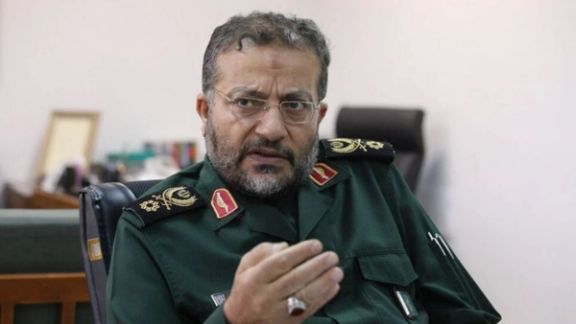
Iran’s Revolutionary Guards will take a share of an ambitious housing construction project promised by the government, that could cost billions of dollars.

Iran’s Revolutionary Guards will take a share of an ambitious housing construction project promised by the government, that could cost billions of dollars.
General Gholamreza Soleimani, the commander of the Basij, a paramilitary wing of the Islamic Revolution Guard Corps (IRGC) said Sunday that his organization will construct 100,000 residential units. President Ebrahim Raisi (Raeesi) has promised to build one million units a year during his four-year term, a huge project that would need billions of dollars a year, although the government has not presented a budget or a clear plan.
Soleimani did not mention how much the Basij would charge the government for the project. The IRGC is the largest economic force in the country, having dozens of companies in all sectors. Its business involvement has been a controversial issue among Iranians.
Iran’s government faces a deficit equal to 35-50 percent of its overall budget, as US sanctions have cut off most of its oil export revenues. It also has to cope with a falling currency and near 50 percent annual inflation.
A previous housing project during the presidency of Mahmoud Ahmadinejad was never completed although it was carried out during high oil prices and up to $100 annual oil exports.

An Iranian lawmaker and an industry official say that Chinese vessels have been avoiding Iranian ports and Iranian ships are not allowed into Chinese ports.
At the same time, parliament’s research center has demanded that before signing any agreement with China, to clarify Beijing’s position regarding Western sanctions.
Iran has been promoting close relations with China as a counterweight to the United States, amid crippling sanctions imposed by Washington since 2018. Tehran has reached agreement over a 25-year strategic pact with Beijing, saying that China is ready to invest hundreds of billion of dollars in Iran.
But Massoud Daneshmand, member of the association of transportation companies told Iranian Labour News Agency (ILNA) that because of US sanctions against Iranian ports not even Chinese vessels do not use the facilities, unloading their cargo in Dubai from where the goods are transported by Iranian ships.
Hours after Daneshmand’s remarks, Mahmoud Abbaszadeh Meshkini, spokesman of parliament’s national security committee told Entekhab website that this is “not a new issue”. He added, “We have our own ways to circumvent the sanctions.”
It is not clear why Iranian officials had not complained before about the Chinese policy of complying with US sanctions and are raising the issue now.
China has generally respected sanctions against Iran, except reports of limited clandestine and indirect oil purchases which go unreported by its customs office.
Earlier in the week, Mohammad Reza Khiabani, the head of Iran’s commercial fleet had said that Iranian vessels have been banned from Chinese ports since last year. Another official has said that China admits Iranian vessels only in its small ports and demands huge fees.
The news about China’s enforcement of US sanctions on Iranian shipping might be embarrassing for hardline supporters of Supreme Leader Ali Khamenei who have been trumpeting Iran’s “Looking East” policy. Khamenei promulgated the policy in 2018, saying that Iran should adopt an Eastern orientation of relying on China and Russia for business and commerce in the face of US sanctions.
Washington has been reportedly leaning on Beijing in recent months to curtail its dealings with Tehran, to pressure it to reach agreement in nuclear talks that started in April. Iran stopped the talks in June and so far, has refused to return to the negotiating table, while enriching more uranium.
In another development, India in September seized three tons of heroin worth $2.72 billion in September and its largest port operator later announced that it would not handle any cargo originating in Iran, Pakistan or Afghanistan.
An Iranian news website reported in 2018 that Dubai's main port handles five times more cargo than all of Iran 20 ports.
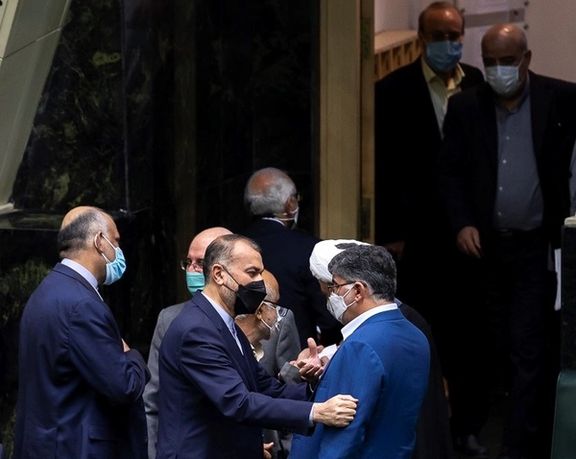
Iran's foreign minister has told a closed-door parliamentary session that Tehran expects US "goodwill" and actions before it returns to nuclear talks.
Lawmakers speaking to media after Sunday's session said Hossein Amir-Abdollahian reiterated that Iran needs to see "serious steps" by Washington before it resumes talks suspended since June.
Alireza Salimi, a leading lawmaker quoted Amir-Abdollahian as saying that Iran's policy is "action for action". Earlier this month, the foreign minister had alluded to demands that Washington should unfreeze some of Iran's blocked funds before Tehran engages in contacts with the US.
Speaking to Tasnim news agency on Sunday, Shahriar Heydari, a member of the parliament's National Security and Foreign Policy Committee, said the foreign minister also thanked Parliament for ratifying a nuclear bill in December aimed at toughening Iran's bargaining position and said this will give the other parties a clear message and enhance the power of Iran’s negotiators.
The parliament passed an act entitled "Strategic Action Plan to Counter Sanctions and Protect Rights of the People Act" in December that obliged the government to step up Iran’s nuclear program further beyond the limits set by the 2015 nuclear agreement with world powers and to reduce Iran’s cooperation with the United Nations nuclear watchdog, the International Atomic Energy Agency (IAEA).
“By the Iranian foreign minister’s own admission, the 'Strategic Action Plan' has drawn the attention of influential countries,” another lawmaker, Behruz Mohebbi, tweeted after the meeting. He added that all parties to the agreement have received "a clear and serious message" and that the government" will have a "strong tool" in its hands in the upcoming talks.
Europeans have recently raised pressure on Tehran to resume the talks. On June 20, two days after the election of Ebrahim Raisi (Raeesi) to presidency, Iran suspended the talks that began in Vienna in April and has delayed its return despite repeated promises of resuming the negotiations “soon”.
Alluding to Iran's accelerating enrichment of uranium to higher fissile purity, a possible pathway to a nuclear bomb, diplomats from Britain, Germany and France, known as the E3, said in a note on Wednesday that the situation with Iran’s nuclear activities has been worsening since negotiations stalled in June.
During a visit by Enrique Mora, European Union’s lead negotiator on Iran’s nuclear issue Thursday, Iran agreed to meet with E3 representatives in Brussels in the coming weeks. According to lawmakers, in Sunday's closed session Amir-Abdollahian said talks with E3, Russia and China, the five remaining parties to the JCPOA, will begin in Brussels on Thursday [21 October]. This in effect would be circumventing the United States if no US representative travels to Brussels to be on the sidelines of the talks, as was the case in Vienna.
After the parliament's meeting with Amir-Abdollahian Sunday, lawmaker Alireza Salimi also quoted Amir-Abdollahian as saying that the Vienna talks must begin "from the point where Trump withdrew from the JCPOA". Former US President Donald Trump withdrew from the deal in 2018 and imposed tough sanctions on Iran.
According to lawmakers Amir-Abdollahian also tried to assure parliament that Iran will not be pressured by the economic hardship prevailing in the country and will seek alternatives to help people in their daily lives. This would be no easy proposition as US sanctions have deprived Tehran of tens of billions of dollars in oil export revenues.
A report by the Plan and Budget Organization prepared in August, before Hassan Rouhani handed the administration to Ebrahim Raisi, was published Saturday that paints a very grim picture of the Iranian economy if talks fail and US sanctions are not lifted.
According to the report, if sanctions continue, in 2024 the government will face bankruptcy and the national currency will lose value tenfold. The dollar may rise to as high as 2,840,000 rials in 2027. Currently the dollar is trading at 270,000 rials.
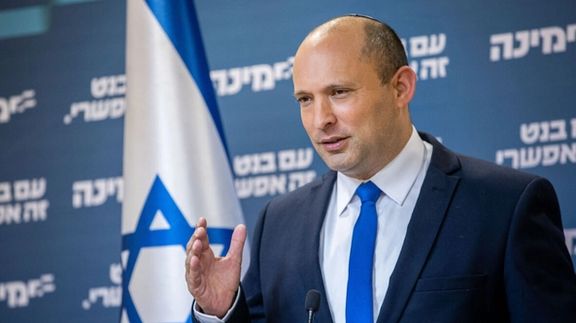
Israeli Prime Minister Naftali Bennett said Sunday he hoped Lebanon and Iraq will free themselves from Iran’s grip that has enveloped their political systems.
He said signs show that these countries might be "able to break free from the strangling grip of the Iranian Revolutionary Guards."
Bennett was addressing lawmakers during a weekly cabinet meeting following last week's gun battles on the streets of Beirut which killed seven people and as Iraq's Shiite militias, that often serve as a proxy for neighboring Iran, took a beating in the national election.
Israel sees "developments and trends emerging from below, of forces who simply had enough with Iranian control and influence," said Bennett.
He added that every place that Iranians enter goes into "a whirlwind of violence, poverty, instability and failure."
The confrontation in Beirut erupted when Iran-backed Hezbollah and its allu the Amla movement called for protests against a judge investigating last year’s massive port explosion. The incident raised fears of the country being drawn into further violence.
Underlying the violence are Lebanon's entrenched sectarian divides and Hezbollah’s growing influence in the past decade in the corrupt political system.
Hezbollah however has decided not to escalate the tension and said it would not be pulled into more violence.
Reporting by AP
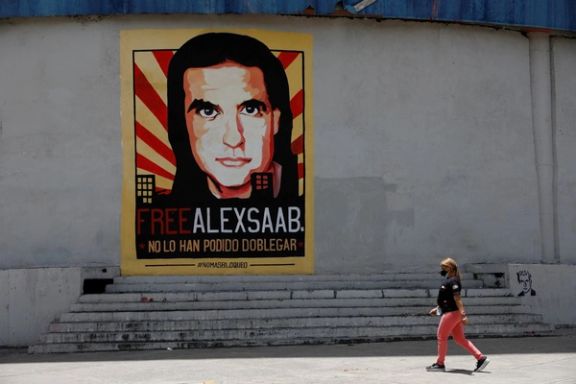
Venezuela said Saturday it would halt talks with the country's opposition in retaliation for the extradition to the US of a close ally of President Nicolás Maduro wanted on money laundering charges.
The announcement came hours after businessman Alex Saab was put on a US-bound plane in Cape Verde after failing in a 16-month fight to prevent his extradition to face money laundering charges in Miami. Saab was arrested in the African archipelago while making a stop on the way to Iran for what Maduro’s government later described as a diplomatic humanitarian mission.
US prosecutors say Saab amassed a fortune wheeling and dealing on behalf of the socialist government, which faces heavy US sanctions.
American authorities have been targeting Saab for years, believing he holds numerous secrets about how Maduro, the president's family and his top aides siphoned off millions of dollars in government contracts for food and housing amid widespread hunger in oil-rich Venezuela.
However, his defenders, including Maduro's government as well as allies Russia and Cuba, consider his arrest illegal and maintain that Saab was a diplomatic envoy of the Venezuelan.
“The government of the Bolivarian Republic of Venezuela repudiates this grave violation of human rights against a Venezuelan citizen, invested as a diplomat and representative of our country before the world,” the statement said.
Report by AP
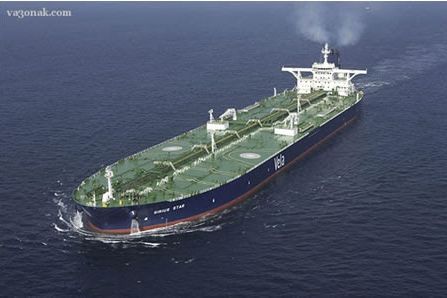
Iran and Venezuela continue exchanging oil products despite US sanctions on both countries, without any visible action by US which tries to engage with both.
An Iran-flagged supertanker has sailed from Venezuelan waters carrying 2 million barrels of heavy crude provided by state-run oil firm PDVSA, according to documents seen by Reuters and vessel tracking services.
The shipment is part of a deal agreed by PDVSA and its counterpart National Iranian Oil Company (NIOC) that exchanges Iranian condensate for Venezuela's Merey crude. The swaps aim to ease an acute shortage of diluents that has cut Venezuela's oil output and exports, Reuters reported last month.
In August 2020. the United States confiscated four Iranian fuel shipments that had been bound for Venezuela, disrupting at the time a key supply line for both Tehran and Caracas as they defied US sanctions. In October 2020, US announced that it had sold the gasoline and refined oil.
Dino I, a very large crude carrier (VLCC) owned and operated by NIOC's National Iranian Tanker Company (NITC), finished loading the Venezuelan oil at PDVSA's Jose port late Friday, according to the documents, a source and monitoring service TankerTrackers.com.
The bilateral oil trade could be a breach of U.S. sanctions on both countries, the US Treasury Department told Reuters last month, citing government orders that establish the punitive measures.
Reuters said a Treasury spokesperson on Saturday declined to comment further on the latest development. If the US allows the shipment to proceed, it would be a change from the Trump era policy of vigorously enforcing US sanctions against Iran.
Already the vessel was allowed to reach Venezuela in September with its transponder turned off while carrying 2.1 million barrels of Iranian condensate.
A second condensate cargo of similar size is expected to be delivered to Venezuela in the coming weeks as part of the swap routine, which will be in effect for six months in its first phase.
The Biden administration has declared its opposition to Trump’s withdrawal from the 2015 nuclear deal with Iran and has entered indirect talks with Tehran to revive the agreement. So far, Washington has kept the Trump-era sanctions, as Iran has failed to reach an agreement to revive the Joint Comprehensive Plan of Actions, JCPOA.
PDVSA first launched the exchange last month by sending 1.9 million barrels of Merey heavy crude on the Iran-flagged supertanker Felicity.
The exchange provides the OPEC nation with a stable supply of blending material needed to convert its extra heavy oil into exportable grades. The pact also delivers heavy oil to Iran for blending, refining or marketing to Asian customers.
Iran and Venezuela have strengthened their cooperation in the last year even under the watchful gaze of the United States, which has in recent years reimposed sanctions on Iranian state entities, including NIOC, and in 2019 blacklisted PDVSA.
With reporting by Reuters